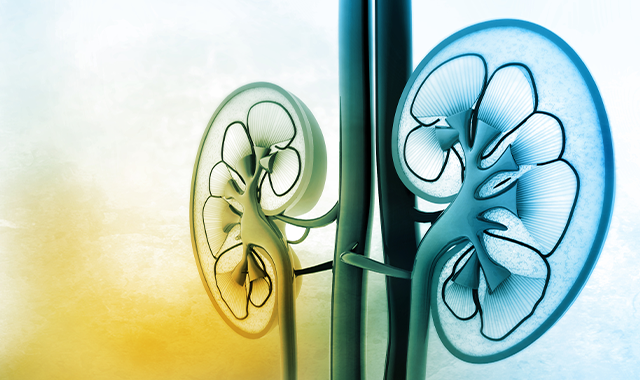Durvalumab/Tremelimumab/Surgery Appears Safe in Renal Cell Carcinoma
Surgery following treatment with checkpoint inhibitors yields no surgical complications in a cohort of patients with advanced renal cell carcinoma, according to Jason Scovell, MD, PhD.
“I think what we show here is that this is a safe place to do a surgery, after the checkpoint inhibitors. We had a couple of complications, but none of these were surgical complications in this cohort of patients,” according to Jason Scovell, MD, PhD.

Treatment with durvalumab (Imfinzi) and tremelimumab-actl (Imjudo) followed by surgery demonstrated safety among those with locally advanced renal cell carcinoma (RCC), according to findings presented during the 2023 Society of Urologic Oncology (SUO) Annual Meeting.
Explaining the rational for the study, Jason Scovell, MD, PhD, Glickman Urologic and Kidney Institute, Cleveland Clinic, said, “We don’t really know what the immune checkpoint inhibitors are doing to the anatomy of the kidney prior to the surgery, and the surgical safety and efficacy for partial and radical therapy for patients with complex locally advanced renal tumors is not well established.”
Accordingly, the single-arm open-label phase 1b study included 25 patients with locally advanced RCC (stage T2b-4 and/or N1, M0 disease) enrolled at the Cleveland Clinic Foundation or the University of Minnesota between 2016 and 2020. At baseline, the median patient age was 61 years (range, 52-65) and the median BMI was 29 (range, 25-32). All 25 patients were White, 8 patients were former smokers, and 17 patients were never-smokers.
The median Charlson Comorbidity was 4 (range, 3-5) and all patients had an ECOG performance status of 0. Twenty-three patients had clinical stage III disease and 2 patients had stage II disease. The pathologic stage was stage I for 1 patient, stage II for 3 patients, stage III for 20 patients, and stage IV for 1 patient. The histology was as follows: chromophobe (n = 1), clear cell (n = 21), papillary (n = 1), HLRCC (n = 1), and unclassified (n = 1). Histologic features comprised 2 patients with rhabdoid, 4 patients with sarcomatoid, and 16 patients with necrosis.
The study design was for patients to receive neoadjuvant therapy followed by nephrectomy, and then adjuvant therapy 4 to 6 weeks after surgery. The investigators evaluated 4 treatment cohorts. In the neoadjuvant setting patients in cohort 1 received 1 dose of durvalumab and patients in cohorts 2, 2a, and 3 received 1 dose of durvalumab plus tremelimumab.
In the adjuvant setting, patients in cohort 1 and cohort 2 received 1 dose of durvalumab. Patients in cohort 2a received adjuvant durvalumab for 1 year, and patients in cohort 3 received 1 dose of durvalumab/tremelimumab following by single-agent durvalumab for 1 year.
Overall, 23 patients received both neoadjuvant and adjuvant therapy and 2 patients received only neoadjuvant therapy.
Tumors were considered to be surgically complex with over half of patients having a RENAL score of 11xh.
The majority of patients received radical nephrectomy (n = 23), with patients undergoing both minimally invasive (n = 8) and open (n = 17) procedures. Six of the patients’ tumors had renal vein involvement. There were no reported intraoperative complications. The median estimated blood loss was 375 cc (interquartile range [IQR], 188-775). Three patients received a blood transfusion after surgery.
There were no intraoperative complications. Five patients had positive margins, which were all located at the renal vein wall. Patients were in the hospital for a median stay of 4 days (IQR, 3-5), with readmission required for 3 patients for diabetic ketoacidosis, thrombocytopenia, and pulmonary embolism. Five 30-day and 90-day Clavien complications occurred.
“I think what we show here is that this is a safe place to do a surgery, after the checkpoint inhibitors. We had a couple of complications, but none of these were surgical complications in this cohort of patients,” said Scovell.
Regarding next steps, Scovell, said, “There’s a lot of molecular work that’s being done on the tissue as part of this trial.”
Reference
Zabell J, Rini BI, Krishnamurthi V, et al. Safety of partial and radical nephrectomy for complex locally advanced renal cell carcinoma after neo-adjuvant immune checkpoint inhibition (durvalumab +/- tremelimumab). Presented at: 2023 Society of Urologic Oncology Annual Meeting. November 28 – December 1, 2023; Washington, DC. Abstract 7.
Newsletter
Stay up to date on recent advances in the multidisciplinary approach to cancer.